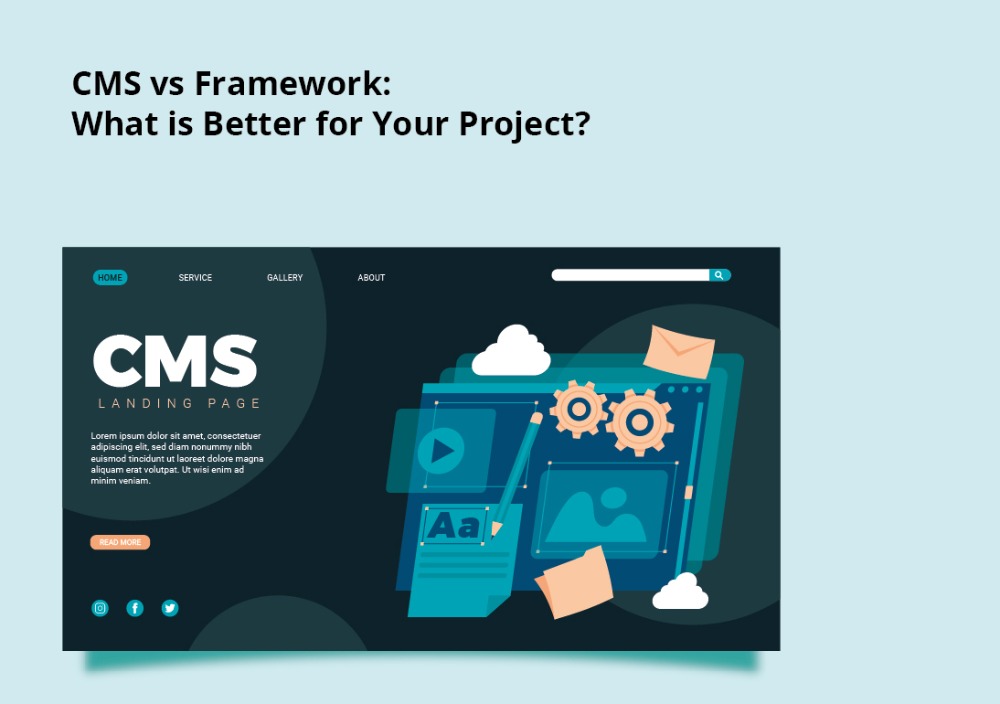Before starting a web development project, business managers have to decide whether the future solution will be based on a CMS or framework. This choice has a considerable impact on the further development process and the final product. It defines how much time programmers will need to complete the work, what budget you’ll spend, and what characteristics and capabilities a web solution will have. So, it’s vital to understand how these options differ and what implications each of them brings to the table.
This article aims to make the CMS vs framework choice easier for you. We’ll briefly explain what these terms mean, compare them based on multiple essential criteria, and discuss what projects they suit best.
CMS and web framework: general overview
Basically, CMS (or content management system) is a type of software that allows users to create web solutions with a set of ready-made building blocks and manage digital content using a standard admin panel. WordPress, Drupal, and Joomla are the most popular CMS examples. To build web applications with the help of a content management system, users have to download the relevant software and customize it according to their business needs.
A framework, on the other hand, is a collection of pre-written reusable code pieces that cover some generic functionalities. Using a framework helps software engineers save time on handling typical programming tasks since they don’t need to create all functions from scratch. Today, there are a wide variety of web frameworks written in different programming languages. The most common examples include Laravel, .Net, and Ruby on Rails.
In general, developing web products based on CMS might be compared to assembling furniture from a number of out-of-the-box elements. Meanwhile, building web solutions using a framework is like ordering custom items designed according to your specific requirements. In the latter case, carpenters will use some wooden materials received from a manufacturer instead of producing them from raw trunks of trees. But you’ll still receive a tailor-made piece of furniture.
Framework vs CMS-based development: key factors to consider
A basic understanding of how content management systems differ from web development frameworks is essential. But, for many business owners, knowing what effect this difference has on the development process and the web solution’s core qualities is much more important. So, let’s take a look at the main aspects you have to factor in when deciding between the web framework vs cms development.
Flexibility
CMS-based solutions have some default functionality that may be customized and extended with various add-ons. For example, the official WordPress plugin directory offers more than 58,000 plugins that users can install on top of basic features. Still, the number of potential modifications is always restricted to the existing CMS capabilities. It means that you can create a working web product using a CMS. But you’ll be able to adjust it to your needs only to a certain extent. In other words, this type of development won’t allow you to implement the requirements that fall outside the scope of the selected CMS and its extensions.
If you decide to build a web product based on a framework, you’ll get an opportunity to include in it any functionality you want. Although developers will use some pre-written pieces of code, they’ll be able to change them as required with absolutely no limitations. Besides, a framework is only a foundation for a web product. To create some unique features, programmers will write entirely new custom code. So, it’ll be up to you to define the requirements for the quality and number of functions, level of product scalability, and third-party integrations.
Security
Security is another criteria that you must consider when deciding whether to select a CMS or web development framework for your project. CMS-based web solutions are more vulnerable to cyber-attacks and more exposed to the risk of data leakages. The reason is that many popular content management systems are open-source, meaning that their code is publicly available. Naturally, it’s easier for hackers to find ways to access a solution if they know how it’s built. Extensions or their updates downloaded from unreliable resources can also compromise the level solution’s security.
Framework-based web products are more difficult to attack since it’s harder for third parties to find security flaws in them. Besides, most modern frameworks provide a set of built-in security features that protect solutions from most common cyber-threats. For example, Laravel offers several security packages that include CSRF protection, data encryption, protection against XSS and SQL injection, etc.
Development time and budget
Building a CMS-based web solution is cheaper and requires less time than custom development. The CMS installation process is usually as simple as the installation of ordinary web applications. It’s even possible to create and customize a basic website in a matter of days. Since most CMSs are targeted at people with no technical background, many tasks at the development and maintenance stages can be completed without the programmers’ involvement. Still, getting assistance from professional developers is highly recommended if you want to build a more complex solution or make some advanced adjustments (e.g., advanced SEO optimization).
Using frameworks for a web project always requires extensive programming knowledge and strong coding skills. Besides, this type of development is quite lengthy. Although there are some pre-written functions that an IT team can use, developers need to do a large portion of the work themselves. The increased development time naturally leads to higher development costs. That’s why framework-based web projects are much more expensive than CMS-based projects. Updating (i.e., adding new features) and maintaining such products will also take more financial resources.
Content management
CMSs provide the default functionality for content management. These systems come with ready-to-use admin panels that allow users to easily change information on a website. Adding, deleting, and editing the content isn’t usually a problem, even for beginners. If you want to get a clearer picture of how everything works, take a look at the WordPress dashboard. Let’s say you need to publish a new blog post. To do so, you’ll just have to select the ‘Posts’ tab in the left sidebar and click ‘Add New’. After filling out the relevant fields (e.g., title, headers, body texts), you’ll need to press the ‘Publish’ button, and the post will appear on your site.
Frameworks do not allow users to manage content - they help developers build solutions (i.e., custom admin panels) that may contain content management functionality. If a decent amount of effort is put into this process, it’s possible to create a custom admin panel that is as user-friendly as out-of-the-box CMSs or even better. But it’s practically an entire sub-project within your web development project. Alternatively, content managers can edit the information on framework-based websites by making changes directly to the site’s files. But this option requires good programming skills, so it’s not a good fit if you’re planning to run a content-intensive website.
CMS or framework: which path to follow?
The CMS/framework choice might seem hard at first. But, actually, there is no single answer to the question of which option is better because everything depends on the type of your project and multiple other factors. To help you make the right decision, here are some general guidelines.
Choose CMS-based development if:
- you’re just starting a new business, it doesn’t have the established processes yet, so you have only some general understanding of what kind of web solution you need
- you want to create a simple corporate website or blog primarily for marketing purposes
- you own an SME business, and investing in framework-based development isn’t a financially justifiable option for you
- you need to develop a web solution very quickly
Choose framework-based development if:
- you own a mature business and have already tried some ready-made solutions but now need software that is explicitly tailored to your company’s needs
- you have unique requirements or need a web solution with complex functionality
- advanced security is a top priority for you
- you have enough resources to invest in framework-based development
If you’re still doubting, we recommend that you find a reliable tech partner and discuss this issue with them in more detail.
Conclusion
Both types of development have their advantages and downsides. If you go with a CMS option, building a web solution will require less time and money, but you’ll be limited by the CMS capabilities. Meanwhile, framework-based development will allow you to create a feature-rich solution adjusted precisely to your business requirements. But the project costs will be much higher, and it will take programmers more time to deliver a final product to you. At Flexi IT, we provide WordPress development and custom web development services. So if you need professional help, just drop us a line.






